
Blog: Sudan: Watchful Waiting, by Dr Nahla Gafer
![]() Cairdeas
Cairdeas
![]() 3rd May 2023
3rd May 2023
This blog was written and submitted by Dr Nahla Gafer, a clinical oncologist at the Khartoum Oncology Hospital, Sudan.
Watchful Waiting.
It all started by hearing some fireworks on Saturday morning, 15th of April. Thank God the boys were at home, in addition to their friend and a lady who helps with the house-chores once a week. When the shooting did not seem to end, we opened the news (Alhadath TV channel), and there it was: a conflict between 2 armed forces in Sudan. We are hearing mixed information about who started the fight, but what was sure is that the fight is extensive at several cities, all parts of Khartoum and using all types of arms.
Through WhatsApp and Facebook we received the information to stay at home, that it was dangerous to leave house, as well as information showing which party is on the right and which party is winning (which is strangely each side!) and that everything will end in a day or two.
From that moment our lives changed 180 degrees. All daily plans were cancelled, even near-future plans became so absurd. A war was held on top of our heads and we have no say in it and not even the right to ask, or check how we are going to survive. WhatsApp messages were active throughout the day. We were checking about our close relatives and neighbors. Comforting ourselves that if they are okay, we shall be okay; that if they are staying, it is safe for us to stay. Advising them to store up water and food supplies, and they in turn advising us to stay on a ground floor: We live on the first floor. It is not possible for us suddenly to change residence.
But our situation is relatively good. People were stranded in the middle of Khartoum in their work or study institutes. With no food, no bed, and no silence at night. There was no transport, no cars. You cannot even pop your head outside the door. And a lot of them ran out of charger or mobile credit. An artist was caught up in the national museum, under the direct fires of a snipper above him. For three days he ate nothing but his paints; luckily, they were organic.
On the second day, there was a 3 hour “truce.” My son’s friend had his father come to a nearby place to pick him up. The house help said it is better for her to try to return home, because living in the peripheries of the city, there is less shooting. [She reached safely through a large lorry that collected a group of people and took them to the other side of Khartoum, across the bridge. Two days later she called. They are without electricity and without water]. We passed the 2nd night only myself and my sons. We took turns in sleeping, in case the sound of the shooting increased, or we were hit, and were forced to move! Although we had no idea where to move to.
Luckily, up to the third day, we had no electricity cut outs. I started filling all containers with water and told the boys to help with that. Then the water supply was cut. I was angry to find a jug under the table missed by my son. Water economizing started when the tap water stopped running: we were eating in the same pan we cooked in, reducing the items to wash; we were collecting used water to drain down the toilet. Just in case, we prepared each a bag with our main documents and essential personal items. I looked back to all my possession in the apartment, reflecting on where, when, and why I got them, how I sweated in order to have them, and realizing that I might have to leave them and never come back.
Meanwhile, I started receiving some text messages from my patients. Some had an appointment for pain follow-up and drug prescription; some were just starting their journey of chemotherapy. To all I had to reply, sorry we are not working tomorrow, and we do not know when we shall return.
I contacted a family whom we were supposed to visit their mother on Monday. The trip is cancelled. Unfortunately, we had not even done the preliminary assessment. We shall wait for the sound of bombings to lower before conducting a meeting through WhatsApp video.
In the afternoon, my phone rang. It was a very nice lady, she told me, “Doctor, I have an appointment tomorrow, are you working?” I asked her where she was calling from as I thought she was staying in one of the few cities unaffected by war, and she answered, “I am in Khartoum, in Sahafa district.” My second question was, “Can you go outside the front door?” and the answer was no. I told her, “We are in war, you cannot go out; neither can I.”
Your life is the most valuable thing
A friend of a friend from another Arab country was trapped in the center of Khartoum. I was informed to contact him on Tuesday. I told him that his location is a death trap, urging him to get out. That triggered the thinking that our location would be a death trap in a few days. I watched some YouTube videos about how cities forge under war as well as how a country changed in 10 years due to war.
The decision came to escape. I had a colleague living at the outskirts in Khartoum. It was a Wednesday, it was a “truce” period. Truce because both fighting parties agreed to cease fire, but the parenthesis is because within a few hours within its start, we hear the bombings and the shootings. We prepared our bags, left a lifetime of possessions and pastimes, and walked into the deserted streets. Sometimes being alone in a street with not a single sound, not even a bird chipping, can be one of the most frightful experiences – it’s like moving in the dark; you do not know what might come next.
We reached the main road, ready to run in case we see any military vehicle, except the ones near our house, with whom there was a tacit pact: first day they arrived, they told my son and his friend, when they ventured out, “stop don’t approach”; the second day, my son gave the soldiers cigarettes and the third day, when one of the boys pops his head out of the door he takes permission “going to the shop nearby and coming back”, and they nod .. it’s okay. We became prisoners in our own home.
Back to the day we left home, there was no one in the street, until we reached the main road, we took 4 types of transport, walking for interrupted periods, public transport and two lifts. We arrived at our destination in over three hours; a trip that usually takes about 40 min.
The place where we went to is almost in the outskirts of the city, in a neighbourhood much quieter than home. As a consequence of this war, there was no electricity and no water for the last three days; they needed to buy water from a donkey owner, and it was stale. We developed gastroentritis. In the evening we discussed amongst ourselves the importance of leaving the place; already the food supplies of the generous family hosting us were thinning , there was no internet connection and even at night we heard shootings. In the morning, we saw the reason for the discontinuous shooting, at the bridge, there was a battalion on alert.
The trip to the second house was another adventure, along the way, there were army vehicles overturned and burnt. Along the way, we saw the young fighters roaming around in different points of irtikas and road intersections. We heard stories about these “militia” stopping cars, asking in a joking way, do you have X or X (their opponents), the answer would be no. Then they say, “You can go. Happy Eid”. It was not a happy Eid for us, and it was not a happy Eid for the 48 million Sudanese people who had their lives overturned in a few days.
Watching the TV, the army is having a strong hold, that they are winning, that they are chasing the “militia”, and some friends working in the army told me, “You shall hear good news in a day or two;” a week passed, and all news was about complete destruction. Renowned hospitals, a couple of banks, the airport, the ministry of higher education, several blocks of houses, which later became hundreds of houses, were all blown up. Along the torturous trip we saw only the RSF, standing by, not disturbing the people.
The good news is that the two armies were not targeting civilians – mainly; the bad news is that they are using all forces to annihilate each other, with little concern about people’s property, comfort, or life.
Kind people under “unkind” rulers
The Sudanese people, in general, happen to be one of the kindest in the world. If you are a guest or a visitor, you are not expected to pay for anything. We witnessed that several times along the way, to the degree that a stranger paid the Rikso driver and gave us cash in order to cover transport expenses back. He understood that we were economizing on the money we had, and that however long it takes, we shall be walking. That city was far off, away from any shootings, but it was a very hot afternoon.
It was people contacting us by phone, offering their houses, and checking that we were safe. People from Sudan, as well as friends from all over the world, asking about us; checking that we are okay, and ready to help by all means.
A kind family took us into their village. So simple, among the fields [third station]. We witnessed village life: tens of visitors in the day, in addition to the already extended family living together. A lady with her husband and children taking in the families of two of her sisters, and her brother; all that in addition to us four, myself, my sons and our friend from Lebanon.
The “last” bus to safety
On the second station in our trip, for a couple of days, it was paradise; we enjoyed a four story building, with huge stocks of water and food. The internet was good; and together with nurse Mahasin, we started contacting the patients whom we were supposed to visit at home. We chatted with 4 patients and their families; we used the video call for examining the patient, asking the co-patient (carer) to open the mouth, and turn over the patient in order to see the bed sores.
Unfortunately, on the third day, in the evening, the noises from the shooting re-appeared and they were so near to us, we went inside into the innermost part of the house to escape injury. One of the patients we are following remotely mentioned travelling outside Khartoum. I immediately asked her, how are you going to do that. She mentioned, we are renting a bus. I asked her if we can travel with them, that we are four. She came back to me, with a yes. I forwarded the money through bankak (that is, the main bank internet application in the country, which latter malfunctioned, or you can’t connect to it). We were lucky in that the bus they are renting will stop a 20 min walking distance from where we were; otherwise, going across the city to catch the bus, would have been very dangerous. Later I learnt that this company stopped further travels because of lack of buses and fuel.
During the first two hours of the trip we could barely breathe. The bus came by a carro driver, and a bridge, a few hours later we learnt the bridge was attacked and the carro driver was slaughtered by prisoners released from prison and handed white weapons. Three prisons where opened, and the prisoners released, mainly because the prisoners were kept without food for three days; it is unclear which group released the prisoners. Each is accusing the other, in addition to Kataeeb Alzil “literally troops of the dark”, an Islamic terrorist group interested in the propagation of war, and the sabotaging of all democracy efforts.
The family of my “patient”, actually my “saver” lives in a secluded village where social ties are strong, and the people are forward and simple. They had tall walls made of mud, which made need for air coolers minimum; they also had a manual water pump, but there were no telephone or internet connections. Me and my sons stayed there for some time. Our Lebanese friend travelled further north trying to cross to Egypt.
I kept hearing stories from our neighborhood in Menshia, a house near ours was destroyed and three members of the family died on the spot. Shops are not working, banks are not working, western union is not working, the circulating currency is getting smaller, no access to internet banking, no police around, no official guidance or rescue missions. It seems as if the government is targeting its people. The city entered into a difficult phase: no security: you can be stabbed by a knife if you walk down the streets; water and electricity and mobile connections are cut off, no petrol for the cars, and as such no health care, no food supplies entering, making it more dangerous and more expensive to get out. Food supplies are running out, and more crimes appearing with complete absence of the police, even there is organized rubbery: a minivan with 3 or 4 men attacking disserted shops and carrying all valuables. No transport, no work, no schools, no source of income, and no water. All pointing to a volcano of catastrophe soon to erupt.
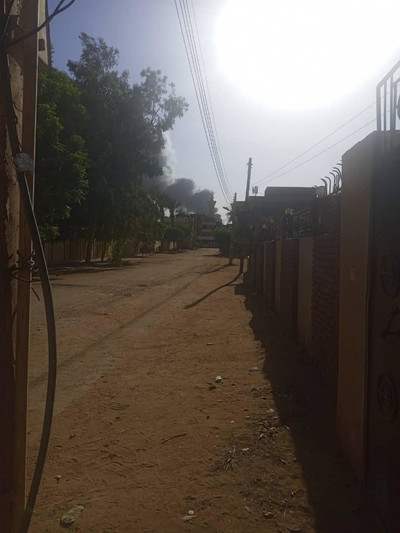
The view from our main door, just before leaving home; in the background, the airport on fire.
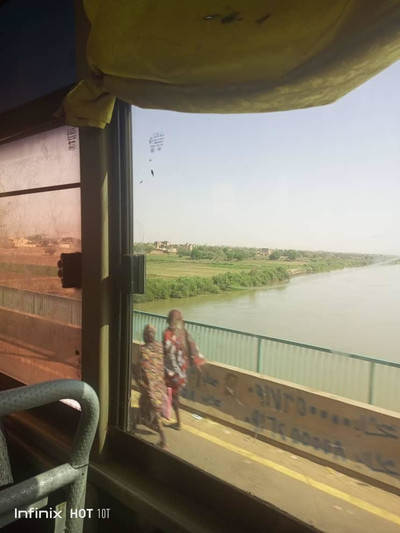
All the way we were seeing people moving out of the city, carrying a small sack each; and others carrying jerrycan containers trying to get water. It was a sad view.
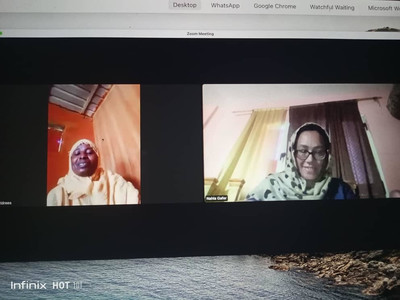
Carrying on the home care through zoom and WhatsApp. Bringing hope to families in their homes, although we ourselves were trapped and insecure.
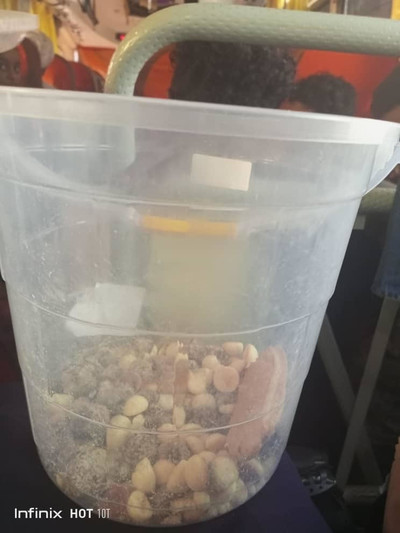
The biscuits for Eid were finished on the bus, offered freely to all passengers by the family.
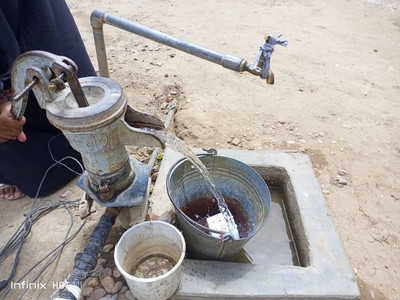
A functioning manual water pump, at the village; reminded me of John Snow and the pump. 1850s.
